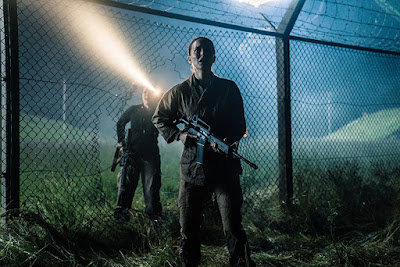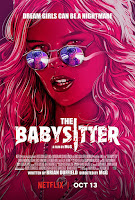Annihiliation
Annihilation
Directed by: Alex GarlandWritten by: Alex Garland, based on
Jeff VanderMeer's novel
Starring: Natalie Portman, Jennifer Jason Leigh
Tessa Thompson, Oscar Isaac, Benedict Wong
Rating: 18A
Release Date: February 23rd, 2018
 |
| Gina Rodriguez & Natalie Portman stare into the proverbial abyss in Annihilation Image Source |
Annihilation follows Lena, an army veteran and biologist, who works as a professor at Johns Hopkins University. Her doctorate is in cellular replication, and her class goes from the very first cell from which life on Earth started, to modern day. This knowledge comes in handy when her estranged husband, long thought dead, shows up in her bedroom six months after he was thought dead. When he begins to become confused and violently ill, the shadowy part of the US government shows up and whisks the two off to "Area X," a base near the US coastline. With a sick husband, top secret government agents, and a misunderstood threat to Earth thrust at her, Lena must discover what happened to her husband, and why he was the only person to escape 'the Shimmer.'
'The Shimmer', is a self contained entity that seems to be growing at an exponential rate, trapping all life within it. Appearing to be a dome or circle of an oil-like liquid that looks like a giant soap bubble, Lena and the government agent who brought her there, Dr. Ventress, (Jennifer Jason Leigh), decide that the only way to either stop or control the growing Shimmer is to enter it and gather information. Assembling a team of like minded intellectuals, Josie Radek, Cass Sheppard and Anya Thorensen, (Tessa Thompson, Tuva Novotny and Gina Rodriguez), they gear up and enter the Shimmer. What they find is disturbing, fascinating, beautiful, shocking and extremely dangerous. Soon enough, the group find themselves in a race against time, (and the Shimmer's environment), to escape the shimmer with information, (and their lives), in tow.
Annihilation is high concept science fiction, with a heavy emphasis on the fiction. For all of the compelling information on cell replication and biology, there's equal parts of philosophy thrown in, with lines like "you're confusing suicide with self-destruction; the two of them are very different," and visual, literal representations of the Nietzschean quote to "beware, that when fighting monsters, you yourself do not become a monster [...] for when you gaze long into the abyss, the abyss also gazes into you." The director, Alex Garland, seems to have grand intellectual ambitions for his adaptation of the VanderMeer novel, and some of the visuals, including glass/crystal trees, bring to mind the work of masters like Dalí, and an alien like cloud that morphs in the style of the Mandelbrot Set, is fascinating. Still, peppering your film with big ideas and interesting quotations does not a movie make. If a film needs anything - it's a solid foundation on which to build itself.
From the start Annihilation doesn't make too much sense - it's told in a fragmented narrative, often jumping backwards, forwards, in between and vice versa. Still, fragmented narratives worked brilliantly in the stellar Arrival and Interstellar. Yet, when time becomes fragmented and nonsensical within the Shimmer and the character's perspectives, it becomes confusing. Is the audience meant to view this story specifically through Lena's eyes? Is her narration reliable? Is the Shimmer confusing the characters? Or is it just lazy storytelling and editing? And I'm all for suspending one's disbelief for a film - of course time travel is impossible in Back to the Future, everything in Star Wars ignores some basic knowledge about space travel, the ability to transfer consciousness is likely unachievable in Avatar; but within the framework of the fantastical worlds mentioned, their own logic and world make sense in their own right. In that sense, Annihilation is a failure.
The biology in the film is where a lot of the riveting storytelling comes from; why are the animals within the film taking on the attributes of other animals, why are there humanoid looking trees? But once the film moves outside of biology to physics it begins to fall apart. Within the Shimmer, all matter seems to meld and the laws of physics begin to blur. But that's impossible. If you remove the laws of physics, nothing makes sense, and nothing can exist like we know it. You can bend the laws of physics, but not break them, and Annihilation is a bull in a physics china shop. Inanimate matter melds with living beings, energy comes from nowhere, and instead of mutating into a giant tumor from radiation, some characters turn into plants or literal fire. Interstellar was able to play with physics but still stay within realistic as well as theoretical limits and still make complete sense. Logic too, seems to take a back seat to these supposed veterans and intellectuals. Why on Earth would someone enter a hostile environment that has killed nearly everyone who has entered it before you without protective equipment? A hazmat suit is protocol for minor spills on some highways... why wouldn't a top secret government organization take the first step in safety? As well, when our characters first enter the Shimmer and awaken to discover they've lost four or five days in consciousness, why wouldn't they immediately leave? Why not step in and out of the Shimmer, and then slowly go deeper to gather information? For a film that starts off using the scientific method as a major plot device, it's frustrating to see it completely abandoned by it's supposed proponents. Even when it becomes clear the Shimmer plays with perception, some decisions don't make sense within the framework set forth by the characters' actions. Overall, Annihilation is an amalgamation of some brilliant ideas and a neat premise that writes itself into an illogical and nonsensical corner, ultimately using a cavalcade of high-concept ideas to say something very simple - humanity is afraid of change. While the film is ultimately a misfire, that's not to say it isn't without merit.
Alex Garland is a brilliant writer. Beginning as a novelist with works like The Beach and The Coma, he also wrote the screenplays for Sunshine, 28 Days Later, and Ex Machina, on which he also debuted as a director. Ex Machina was one of the creepiest and smartest films of 2015, and an explosive film to direct as a first timer. Annihilation has some of the key elements of Garland's past works - philosophy intersecting with technology and the results of such a pairing going awry. I would love to see what he does next. And Annihilation isn't a bad film, per se, but a film that just misses the mark. It's worth seeing for it's beautiful cinematography, and the performances are fantastic. Portman, Leigh, Issac and the rest of the cast do a wonderful job in their multifaceted roles, and Portman works perfectly as a gun-toting badass; something I wouldn't have thought possible until Annihilation. The casting too, subtly showing a group of 5 women as the main characters, capable of saving themselves, is a refreshing step in the right direction. I'd love to see more films with the intellectual daring, refreshing casting changes and brilliant cinematography featured in Annihilation. It's a shame the film is a misfire, but if Annihilation is the price we have to pay to see more films like it, I'd take Annihilation over a Marvel or Star Wars film any day.
In closing, Annihilation is a bold, imaginative and creative work that has a lot of ideas, an exceptional cast, and a capable director. However, crushed under the weight of it's ambitions, a seemingly unfinished script, and logical inconsistencies, it falls just short of a worthwhile cinematic endeavour. Here's hoping, however, Garland, Portman and company can find a more promising story to tell in the near future, because there's definitely some flashes of brilliance in Annihilation. It's a shame they're overshadowed by poor storytelling laid on a rocky foundation.
GRANT'S RATING: 2/5 STARS
Annihilation clip: "Bear Takes Sheppard"



Comments